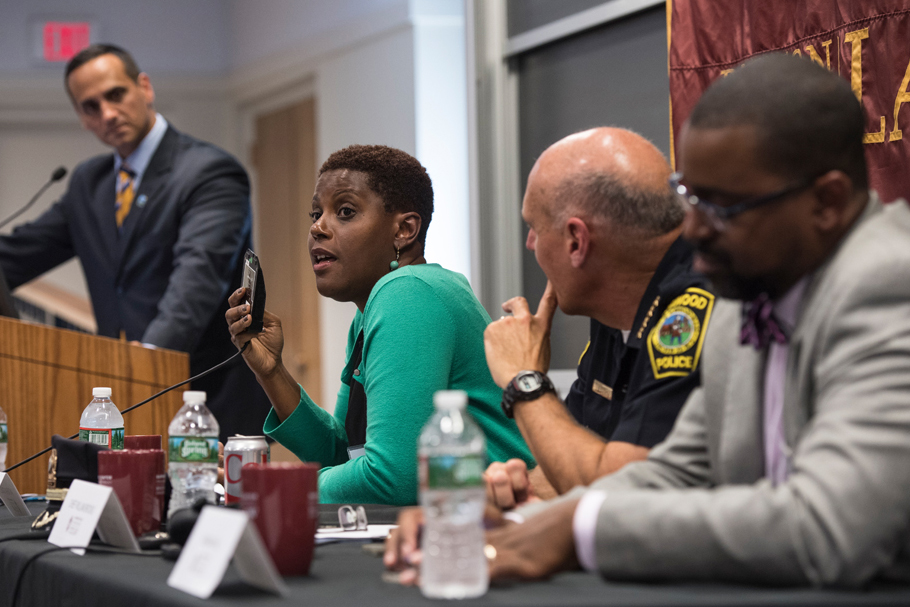Does institutional racism exist in our nation’s agencies? What’s behind the apparent disconnect between our police forces and the communities they serve? Should we be promoting “Black Lives Matter” or “All Lives Matter”?
These were just a few of the challenging questions raised during the panel discussion, “A Conversation about Race and Policing,” sponsored by the Rappaport Center for Law and Public Policy at BC Law on September 9.
The discussion was moderated by Somerville Mayor Joe Curtatone and featured a panel of distinguished guests: William Brooks, chief of the Norwood Police Department and president of the Massachusetts Chiefs of Police Association; Rahsaan Hall, director of the Racial Justice Program at the ACLU; and Natashia Tidwell, counsel at Collora LLP and a former Cambridge police officer and assistant US Attorney.
Mayor Curtatone kicked off the discussion with one of the most pressing questions that government officials and policymakers face today: whether public trust in the government has been lost, and if so, whether that trust can be restored.
Tidwell answered yes to both questions but added that policing is only one aspect of institutional racism.
Hall agreed. Today’s police practices stem largely from America’s history of slavery; racism is socially ingrained in our culture, he said. To target and focus on policing is merely “dealing with a Band-Aid, when there is a gaping wound underneath.” What also needs to be recognized is that police are often unfamiliar with the communities they serve, Hall said. When officers lack appreciation for communities and their history, discriminatory police practices often result.
Another aspect of the problem, as both Tidwell and Brooks pointed out, is that police officers are asked to do too much, requiring them to address a wide spectrum of needs, including substance abuse, mental illness, and other matters for which they are just beginning to receive training. They said that more resources need to be poured into training police officers on these issues.
The panelists then turned their attention to whether the appropriate slogan for the recent activist movement is “Black Lives Matter” or “All Lives Matter,” the latter representing the view that there is no need to place particular emphasis on the value of black individuals over those of other racial backgrounds. Tidwell believes that there is a misunderstanding about the meaning of “Black Lives Matter” and that it is needed because, historically, black lives have not mattered, and non-black individuals need to learn to better relate to and empathize with the black community.
The group’s consensus was that there is much work to be done within our government agencies and out on the streets, but “Black Lives Matter” already has had an impact. Today, significantly more attention is paid to racial bias training and other anti-discrimination initiatives in police departments as a result of the movement.
With continued activism and advocacy, there is the potential to break down institutional racism in our nation, but the pressure for change must be steadfast, Hall said. “Power does not concede without demand.”
In photograph, left to right, Joe Curtatone, Natashia Tidwell, William Brooks, and Rahsaan Hall. Photo by Christopher Soldt, MTS, BC


